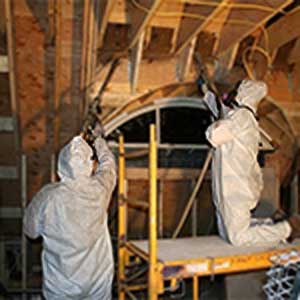We’re here for you around the clock, ensuring that help is always within reach, especially during critical fire and flooding emergencies.

Our team’s experience spans both residential and commercial jobs, showcasing our ability to manage projects of any scale effectively.

From water damage and fire & smoke damage to air duct cleaning and biohazard cleanup, we bring your property back to its pre-disaster state.
Know What To Do When Basement Floods
Your basement usually serves as a storage room for clothing, furniture, decorations, and other family possessions. However, surprises sometimes happen due to unavoidable circumstances like heavy rain, a burst pipe, or a floor drain backing up. They all lead to a flooded basement.
How to Address Basement Flood Clean Up
Your basement usually serves as a storage room for clothing, furniture, decorations, and other family possessions. However, surprises sometimes happen due to unavoidable circumstances like heavy rain, a burst pipe, or a floor drain backing up. They all lead to a flooded basement. This can cause you to panic.
You need to act quickly. You must do things in that flooded area immediately to save yourself, your family, and your property from harm and serious damage.
And one thing that should be on top of your list is to call a trusted water damage restoration professional. In the meantime, learn a few steps and tips on what to do when the basement floods.
Consider Calling Your Insurance Company After a Basement Flood
You must call your insurance company and understand which types of water damage your policy covers. According to FEMA, most homeowners insurance doesn’t cover flood damage since flood insurance is a separate policy. In most cases, it will cover basement flooding damage if it results from sudden and accidental events.
Moreover, the damage can be documented by taking photos and videos of the affected area and belongings for insurance purposes.
What to do when the basement floods?
Safety: First and Foremost
- Check if there is a risk of electrical shock. Before you enter the basement, turn off the electricity at the main breaker box. However, if the breaker box is in the flooded basement, call a trusted electrician or your local power company to help first.
- Check for gas leaks. If you smell gas, don’t attempt to go to your basement. Gas leaks are fatal, so you must leave the house and contact your utility company.
- Check if the flood or standing water is contaminated. Pollutants, chemicals, and sewage in floodwaters are dangerous and pose a health risk to you and your family. Avoid contact with contaminated floodwater as well as contaminated items.
- Check the structural integrity of your flooded basement or the house above it. If you doubt your basement is structurally safe, please do not enter. Seek help from a professional.
Basement Flood Clean-Up
- It is always a safety best practice to put on protective gear such as a mask, goggles, boots, or thick gloves before entering the basement. Ensure a well-ventilated space or good air circulation. This can help speed drying and allow fumes to air out while working. Now that it is safe to enter, you can start doing things, and the next step is cleaning the flooded basement.
- Remove and separate contaminated and damaged items from the water. Check which ones are still salvageable. Then, get these items out of the basement. Dry off any dampness left to reduce mold growth.
- Extract and remove the water. You can rent a wet/dry vacuum or portable sump pump to eliminate excess water. But if a flood is significant, call in water damage restoration professionals. They have the right tools and equipment to get water out of the basement completely.
- Keep the humidity level as low as possible to prevent mold, especially after a basement flood. You can do this by opening all windows and running a dehumidifier and fans to increase ventilation.
- After water extraction, thoroughly dry the whole area and disinfect. Carefully wash and sterilize all items that were saved and contaminated by floodwaters.
Tips to Prevent Basement Floods
Preventing future basement floods involves a combination of proactive measures. Here are some steps you can take to safeguard your property and minimize flood damage:
- Determine Base Flood Elevation (BFE): Find out the BFE for your home. The BFE represents how high water is expected to rise during flooding in high-risk areas. Knowing this information helps with floodplain management regulations and building decisions.
- Store Valuables Above BFE: Keep valuables and essential documents in waterproof or water-resistant containers above the BFE, preferably on an upper floor. Make copies and store them online or offsite.
- Clean Sewer Lines: Check sewer lines and septic systems for blockages, overflows, and backups. These systems also require preventative care to function properly at all times.
- Clean Gutters: Clean your drains and gutters at least once a year. Clean gutters remove clogs and excess debris, allowing easy water flow from the roof to the downspout.
- Floodproof Basements: If you have a basement, minimize damage by sealing walls with waterproofing compounds and installing a sump pump. Consider flood vents in foundation walls to allow water to flow through and reduce structural damage.
- Inspect your basement’s walls for weak spots, cracks, and signs of water damage. Make sure that windows are correctly installed to prevent leaks.
- Let an expert waterproof your basement and properly seal cracks and holes. This will help prevent flooding.
- Get Flood Insurance: Most homeowners’ insurance policies do not cover flood damage. Consider purchasing flood insurance for your home and its contents, even if you don’t live in a high-risk flood zone. Document your belongings to facilitate the insurance claims process.
- Replace Carpeting with Tiles: Tiles are more flood-resistant than carpets. Using tile or other flood-resistant materials in areas below the BFE can help reduce water damage.
- Elevate Mechanical Units and Utilities: Elevate or floodproof mechanical units, furnaces, water heaters, electrical systems, and other utilities at least 12 inches above the BFE. This prevents damage during floods.
Seek Help from Superior Water Damage Experts as a 5-star Flood Cleanup Company.
With the tips above, you know what to do when the basement floods. However, if you’ve done all that has to be done and you’re still in doubt, Superior Flood and Fire will help you feel safer from a flooded basement.
Our skilled professionals can help you with any emergency basement flooding. Please don’t hesitate to call Superior Water Damage San Jacinto for water damage restoration services in a flooded basement. We are on call 24/7 at (951) 719-7313 to serve you and the surrounding areas of San Jacinto. We provide not only basement flood cleanup but also fire damage restoration and mold remediation services.



